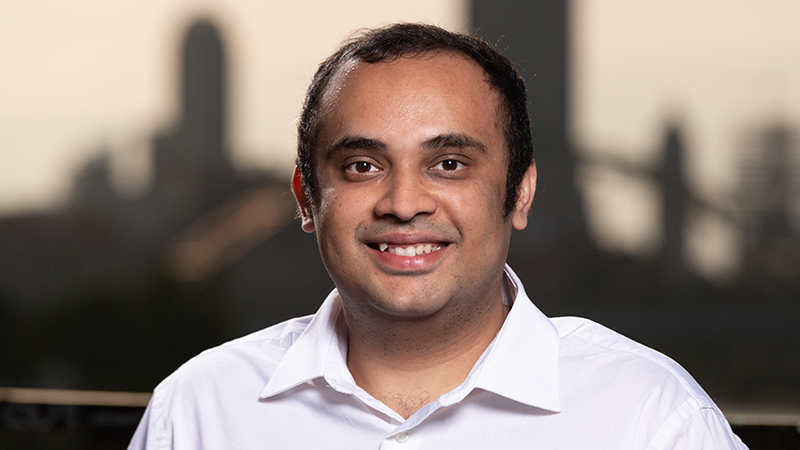UCLA Computer Science Alumnus Cracks Decade-Old Code, Wins Top Computing Award

Courtesy of Aayush Jain
Aayush Jain Ph.D. ’21, one of three researchers who achieved what Quanta Magazine called the “crown jewel” of cryptography in 2020, received the best doctoral dissertation award for his research on the subject from the world’s leading computing society, the Association for Computing Machinery (ACM).
Now entering his second year teaching computer science at Carnegie Mellon University in Pennsylvania, the India-born computer scientist, who gave up his love of cricket (due to an injury) for mathematics as a teenager, never had formal training in computer science.
“I was mostly a mathematician interested in seeing math in action,” said Jain, whose doctoral thesis advisor at the UCLA Samueli School of Engineering was Amit Sahai, the Symantec Term Professor of Computer Science and one of the three scientists credited for the cryptographic breakthrough in indistinguishability obfuscation (iO) — a theoretical master tool for encryption that preserves the functions of a piece of software while rendering its source code undecipherable. “This has been a question that was open for such a long time and many people had tried to solve this,” Jain said. “In fact, some believed that iO perhaps did not even exist.”
Before moving to the U.S., Jain attended the Indian Institute of Technology in New Delhi, majoring in electrical engineering for both his bachelor’s and master’s degrees because he said he wanted to find a middle ground learning both math and physics. He soon found his passion for cryptography — the science of concealing and securing information using techniques derived from mathematical concepts — and worked as a fellow at Microsoft Research in India, where he learned more about the subject and decided to pursue a Ph.D.
Weighing several school offers, Jain chose UCLA Samueli after visiting the campus at Sahai’s invitation.
Over the past 20 years, Sahai has established himself as one of the world’s top cryptography researchers. He directs the National Science Foundation-supported Center for Encrypted Functionalities at UCLA, and is a fellow at ACM and the International Association for Cryptologic Research.
But it was more than Sahai’s list of major accomplishments that made an impression on Jain.
“When I visited Amit for the first time, we discussed a technical problem and I could feel a special connection,” Jain recalled. “Amit excels at identifying the needs of the students. I would thank him the most for helping me to develop big-picture tastes in research and for instilling in me the confidence to be more fearless in research.”
“It’s a tightly knit department and everyone takes personal interest in the development of students,” Aayush Jain said of his experience studying for his doctoral degree in the Computer Science Department at UCLA.
In 2020, working alongside Sahai and Huijia “Rachel” Lin of the University of Washington, Jain proved that iO does, in fact, exist. The team unveiled its landmark findings in a preprint archive, a common practice in which researchers present a preliminary version of a paper before it goes through a peer review process. The breakthrough instantly drew rave reviews, including a feature in Quanta Magazine and in Forbes. A peer-reviewed paper was published and presented the following year at the 2021 ACM Symposium on Theory of Computing.
ACM selected Jain’s Ph.D. dissertation, “Indistinguishability obfuscation from well-founded assumptions,” for its 2022 Doctoral Dissertation Award honoring the best doctoral thesis in computer science and engineering, which also includes a $20,000 prize.
Cryptography scientist Craig Gentry, whose dissertation detailed the first fully homomorphic encryption he constructed that allows a computer to function with encrypted data, won the same award in 2009 and served as an inspiration for Jain’s research.
Looking back, Jain said his time at UCLA provided an important springboard for his teaching and research career.
“It’s a tightly knit department and everyone takes personal interest in the development of students,” Jain said. “I feel close to so many other professors and could routinely talk about different research/non-research things, which was memorable.”
Now, as an assistant professor at Carnegie Melon, Jain is leading his own research group aiming to develop efficient obfuscation schemes by utilizing underleveraged assumptions and exploring new sources for hard problems previously well-studied in other domains.
“I believe that cryptography and complexity are a match made in heaven,” Jain said. “This area could be a source of well-understood problems requiring us to realize new feasibility goals in cryptography that have eluded us.”
